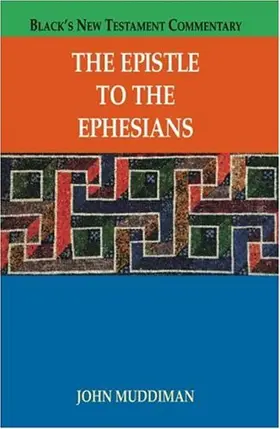

Epistle to the Ephesians
in Black's New Testament Commentary
Pages
338
Publisher
Hendrickson
Published
1/1/2004
ISBN-13
9781565634046
In this comprehensive new commentary, John Muddiman begins by arguing that to be able to draw conclusions about the text of Ephesians, each scholar must take a position about its Pauline or non-Pauline authorship. He therefore offers an extensive introduction, which discusses various approaches to this question, including his own, detailing the evidence for each position. All the perspectives of major modern scholars are discussed and assessed, particularly on the question of Ephesians' relationship to Colossians. The implications of the question of authorship for evaluating Paul's theology are extensively discussed. Black's New Testament Commentary series presents a reliable and enlightening exposition of the New Testament for the modern reader. Written by highly respected biblical scholars under the editorial directorship of Morna D. Hooker, each commentary offers a paragraph-by-paragraph exposition based on the author's own, fresh translation of the biblical texts. Other features include insightful introductions to the important historical, literary, and theological issues; key terms and phrases from the translation highlighted in the commentary where they are discussed; explanations of special Greek or foreign terms; references to important primary and secondary literature; and a Scripture index.
Collections
This book appears in the following featured collections.
- New Testament Commentaries & Monographs by Princeton Theological Seminary
Reviews
This is an under-appreciated commentary in the British Black’s NT commentary series. What I appreciate about this commentary is its readability and ability to explain the Greek text and interpretive possibilities in straightforward English. Muddiman has an interesting take on Pauline authorship of Ephesians; he essentially argues a disciple of Paul has produced Ephesians based on the kernel of a genuine letter of Paul. This means Muddiman is comfortable discussing interpretations of Ephesians based on the assumption that someone later than Paul produced it. Yet he extensively highlights connections between Ephesians and Paul’s other letters to explain difficult texts and sort through options. At points, Muddiman will also treat the history of interpretation of difficult texts. For example, on 3:18 he highlights the range of interpretations from Patristic times of what Paul may mean in talking of “breadth and length and height and depth.” Because it’s over 20 years old, Muddiman not be your main commentator for up-to-date exegesis, but its scholarly Anglican sensibility make it a good supplementary volume to consult.
An interesting take on Ephesians- that it is text pieced together by a post-pauline follower using Pauline material. Overall I do like this one. It's easier to use, and even if one is not sold on his conclusion, it cannot be said Muddiman hasn't been honest, charitable, and thorough in his engagement with folks on all sides of the contentious issues which come up in dealing with Ephesians (authorship, place of origin, audience, household code material, vocabulary).
Because it is commonly considered post-Pauline, the letter of Ephesians typically has not been well-served with quality commentaries and scholarly monographs, a situation completely out of keeping with its standing and influence throughout the history of the church. Some small degree of remediation has been made by the recent addition of commentaries by Best (1998), O�Brien (1999), Yoder Neuf eld (2002), and Hoehner (2002) to those by Barth (1974), Schnackenburg (ET 1991), and Lincoln (1990). The offering of John Muddiman now enters the scene, originally released in Britain in 2001 as part of Black�s series of New Testament co mmentaries and reprinted in the U.S. by Hendrickson without revision. This work is quintessentially British, crisply and clearly written, in lively�sometimes feisty�convers ation with Lincoln, Best, Schnackenburg, and Mitton, among others, and reflecting the historical-critical emphasis of the last few generations of New Testament scholarship in the U.K. Ephesians has presented a major puzzle to scholars in that it resists identification with any historical situation. Further, it is difficult to discern any precise theological thrust of the letter, since it contains no thesis statement or obvious transition to the body of the letter, as Muddiman notes (7, 97), nor clearly delineated theological polemic.
[Full Review]



